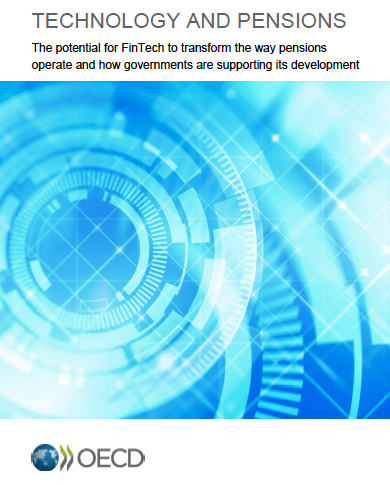
How can FinTech to transform the way pensions operate and how governments are supporting its development?
This is a subject of a report by OECD (2017) entitled Technology and Pensions :
“This report explores the early regulatory implications of the growing role of technology in
pension provision, and look at what governments are doing more generally to support its
development for the benefit of consumers.
Financial technology (“FinTech”) and related technological developments such as
RegTech (using technology to facilitate regulatory compliance) have the potential to reshape
private pension design and delivery. Individuals are increasingly required to make
complex choices about their pension finances, and consumer engagement with financial
services in general is becoming more digital. FinTech can improve the ways in which
pension providers interact with individual members: enhanced communication techniques
can encourage greater engagement; digital disclosure can reduce compliance costs; roboadvice
can make financial planning more accessible. New technologies are also relevant
to pension providers’ internal processes, including product design, transaction processing,
risk management and compliance. The improvements in efficiency that technology allows
can also translate into lower costs both for pension providers and for members.
Reliance on technology can also create new risks. Less educated and less well-paid
workers might be excluded from technological progress because they cannot or will not
engage with new methods of communicating. Non-regulated entities from other sectors
might cherry-pick some aspects of pension provision, leaving traditional players with less
profitable businesses and creating regulatory risks. There are also concerns over data
protection and data security as well as consumer protection issues relating to the
suitability of the services and products offered.
Regulation must therefore achieve a balance between the objective of encouraging the
development of FinTech-enabled solutions to benefit consumers and that of ensuring
adequate protection against the potential risks to consumers. Several jurisdictions have
been addressing this balance through programmes that intend to work directly with
providers to foster and encourage the development of FinTech-enabled services, while at
the same time closely monitoring and mitigating the potential risks that emerge in the
process. These types of programmes go by several names, but typically include those
referred to as innovation hubs, FinTech accelerators or incubators, and regulatory
sandboxes. Such programmes can be useful tools to ensure that the financial consumer
risks presented by technological innovations are mitigated while also ensuring that
protections in place do not inadvertently stifle innovation, thereby maximising the
ultimate benefit for consumers.
The key findings of this report are:
-FinTech applications are increasing the accessibility of investing in pensions to a
broader consumer base and making communications with pension savers more
effective.
-FinTech is increasing the efficiency of the operation of pension schemes through
risk management applications, the automation of investment processes and the
facilitation of regulatory compliance.
-Governments are making substantial efforts to support the development of
FinTech.
-Innovation Hubs are becoming a key component in regulatory support to help
new businesses understand how existing regulation applies to their ideas”.
You can read full report at https://www.oecd.org/pensions/Technology-and-Pensions-2017.pdf
